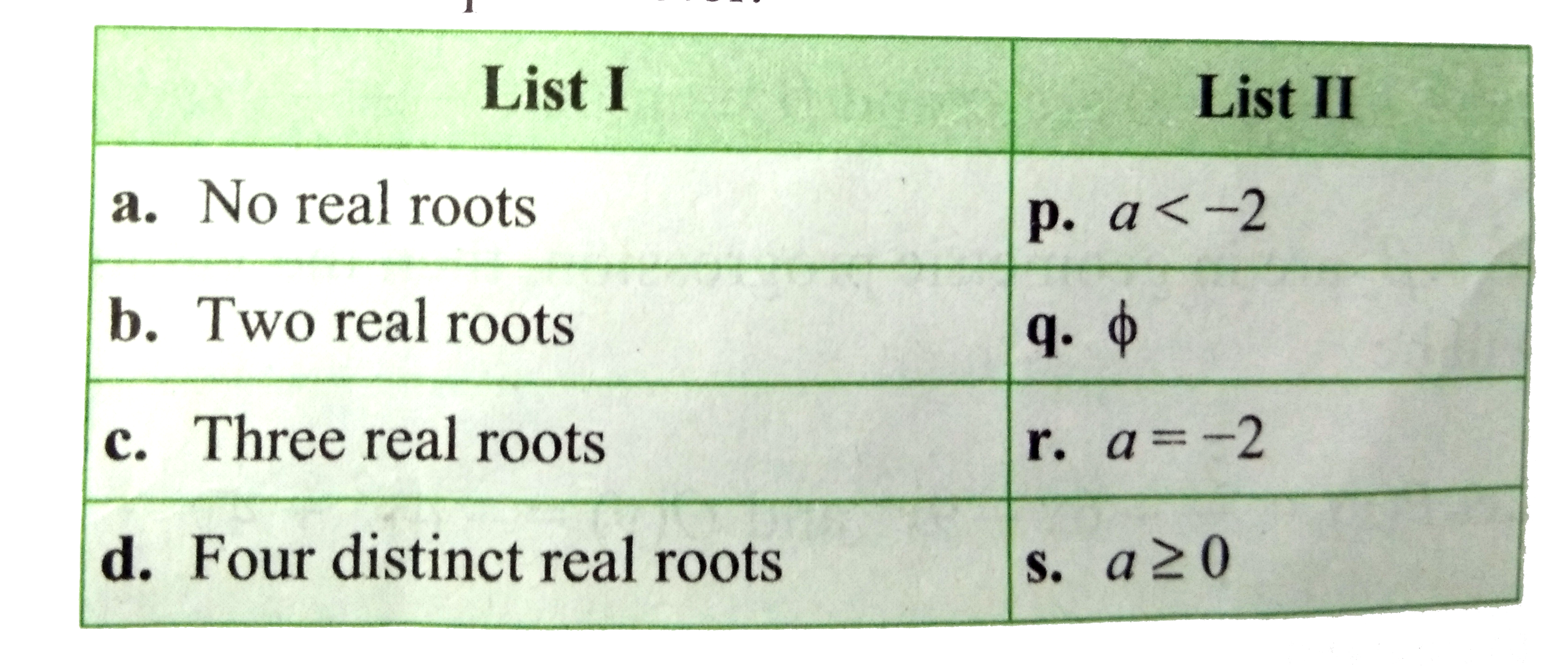lf the quadratic equations x2+bx+c=0 and bx2+cx+1=0 have a common root then prove that either b+c+1=0 or b2+c2+1=bc+b+c. Solution in Tamil
b+c+1=0
b2+c2−1=bc−b−c
b+c−1=0
b2+c2+1=bc+b+c
The correct Answer is:1,4
Equations x2+bx+c=0 and bx2+cx+1=0 have a common roots.
(bc−1)2=(c−b2)(b−c2)
⇒b2c2+1−2bc=bc−b3−c3+b2c2
⇒1+c3+b3=3bc
⇒(1+c+b)(c2+b2+1−b−c−bc)=0
⇒b+c+1=0andc2+b2+1=c+b+bc
Topper's Solved these Questions
- THEORY OF EQUATIONSBOOK - CENGAGECHAPTER - THEORY OF EQUATIONSEXERCISE - Exercise (Comprehension)
37 Videos
- THEORY OF EQUATIONSBOOK - CENGAGECHAPTER - THEORY OF EQUATIONSEXERCISE - Exercise (Matrix)
6 Videos
- THEORY OF EQUATIONSBOOK - CENGAGECHAPTER - THEORY OF EQUATIONSEXERCISE - Exercise (Single)
89 Videos
- STRAIGHT LINESBOOK - CENGAGECHAPTER - STRAIGHT LINESEXERCISE - JEE Advanced Previous Year
4 Videos
- THREE DIMENSIONAL GEOMETRYBOOK - CENGAGECHAPTER - THREE DIMENSIONAL GEOMETRYEXERCISE - Question Bank
12 Videos
Similar Questions
Consider an unknow polynomial which divided by (x−3) and (x−4) leaves remainder 2 and 1, respectively. Let R(x) be the remainder when this polynomial is divided by (x−3)(x−4).
If equations R(x)=x2+ax+1 has two distint real roots, then exhaustive values of a are.
View SolutionMatch the following for the equation x2+a|x|+1=0 where, a is a parameter.

View SolutionThe value of expression x4−8x3+18x2−8x+2 when x=2+√3
View Solutionabout to only mathematics
View SolutionThe equation of the plane which has the property that the point Q(5,4,5) is the reflection of point P(1,2,3) through that plane, is ax+by+cz=d where a,b,c,d∈N. Find the least value of (a+b+c+d).
View SolutionIf ax2+bx+c=0andbx2+cx+a=0 have a common root and a≠0 then a3+b3+c3abc is A. 1 B. 2 C. 3 D. 9
View SolutionIf the quadratic equations x^(2)+bx+c=0 and bx^(2)+cx+1=0 have a common root then prove that either b+c+1=0 or b^(2)+c^(2)+1=bc+b+c
View SolutionIf x^(2)+bx+c=0,x^(2)+cx+b=0(b!=c) have a common root then b+c=
View SolutionIf x^(2)+ax+bc=0 and x^(2)+bx+ca=0 have a common root,then a+b+c=1
View SolutionIf the equations ax^2+bx+c=0 and cx^2+bx+a=0, a!=c have a negative common root then the value of a-b+c=
View SolutionIf a, b, c are positive real numbers such that the equations ax2+bx+c=0andbx2+cx+a=0, have a common root, then
View SolutionIf the equations x^(2)-ax+bc=0 and x^(2)+bx+ca=0 have a common root, then a + b + c =
View SolutionIf the equation x^2+ax+bc=0" and " x^2-bx+ca=0 have a common root, then a+b+c =
View Solutionlf the quadratic equations x2+bx+c=0 and bx2+cx+1=0 have a common root then prove that either b+c+1=0 or b2+c2+1=bc+b+c.
View SolutionIf a, b, c are positive real numbers such that the equations ax2+bx+c=0andbx2+cx+a=0, have a common root, then
View Solution
